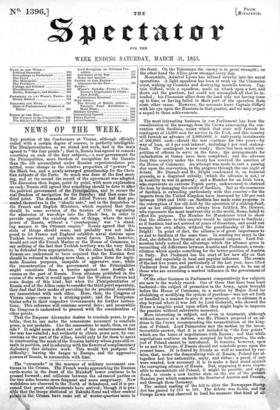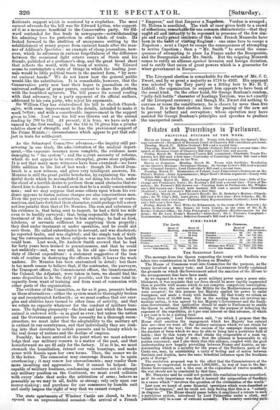The most interesting business in our Parliament has been the
consideration of the message from the Crown annonnoing the con- vention with Sardinia, under which that state will furnish its contingent of 15,000 men for service in the Peat, and this country will furnish an advance of 2,000,0001. ir nail-yearly instalments of 500,0001. each—should the war e-.,ntinue for two years—by way of loan, at 4 per cent interest, including 1 per cent sinking- fund. The contingent is now ready ; there has been much com- petition of officers to serve in the force ; the arrangements for embarkation at Genoa have been completed; and the advance from this country under the treaty has received the sanction of the House of Commons. An attempt was made to cast a passing slur upon the convention, in the progress through the one night of debate. Mr. Disraeli and Mr. Bright condemned it, on financial Founds, as a disguised subsidy, (which the advance is not,) or in hostility to wax in general ; and a Member for an Irish town, who represents an extreme Popish party, endeavoured to obstruct the loan by damaging the credit of Sardinia. But as the commerce of Sardinia is extending particularly with this country—for the imports from the United Kingdom have increased by 150 per cent between 1848 and 1852—as. Sardinia has made some progress in the redemption of her old debt by the operation of a sinking-fund, and as her obligations have always been fulfilled, Mr. Bowyer, who represents the most insolvent city in the world, Rome, failed tc: effect his purpose. The Member for Manchester tried to show that the alliance to this country would be injurious to Sardinia ; as if Sardinia had not arrived at years of discretion, and could no manage her own affairs, without the guardianship of Mr. John Bright! In point of fact, the alliance is of great importance to us and to Sardinia at the same time. In sending her army to the East, she defends her frontier at an advanced outpost. Lord Pal- merston lately noticed the advantage which the alliance gives in reconciling old differences between Austria and Piedmont; a recon- ciliation which speaks something for the better position of Austria in Italy. But Piedmont has the start of her new ally on that ground, and especially in local and popular influence. The events of the last five years, and partioularly of the last year, have lifted Piedmont from the position of a tenth-rate power, to be one of those who are exercising a marked influence in the government of Europe.
Of the other business in Parliament comparatively few subjects are new to the weekly record. One of those that have been least hacknied—the subject of promotion in the Army, again brought before the House of Commons, in a motion by Major Reed for abolishing or modifying the system of purchase—was not set forth or handled in a manner to give it new interest, or to advance it a step beyond where it was left by Lord Goderich, who showed the House a tangible point upon which they might begin to improve the practice without subversive measures.
More interesting in subject, and even in treatment, although without success as a motion, was Mr. Phinn's proposal of an ad- dress to the Crown recommending the reconstitution of the king- dom of Poland. Lord Palmerston met the motion by the incon- trovertible answer, that it is not included in "the four points" which are the bases of negotiations with Russia ; and that while negotiations continue on bases accepted by both parties, the sub- ject of Poland cannot be introduced. It remains, however, open to us and to Europe, if Russia should not conclude peace upon the present bases. It is feared by friends as well as asserted by ene- mies, that, under the demoralizing rule of Russia, Poland has al- together lost her nationality, unity, and virtue ; a proof, if any- were wanted, how necessary it is to make a final stand against the corrupting advance of Russia. But, supposing it were impos- sible to reconstitute old Poland, it might be possible, and expe- dient, to create a new barrier state on the site of the present Russian post which commands the frontier of Austria and Prussia, and through them Germany.
The second reading of the bill to alter the Newspaper-Stamp Act has passed by 215 to 161. The debate was feeble, and Sir George T.Awis was observed to lend his measure that in of of-
fectionate support which is rendered by a stepfather. The most earnest advocate for the bill was Sir Edward Lytton, who support- ed it as a measure beneficial to the Conservative party. Sir Ed- ward contended for free trade in newspapers—notwithstanding his admiring love for protection in other kinds of trade. He looked forward to the abolition of anonymous writing by the establishment of penny papers from eminent hands after the man- ner of Addison's Spectator: an example of cheap journalism, how- ever, which he advances in curious forgetfulness of the difference between the occasional light octavo essays of Steele and his friends, published at a perfumer's shop, and the great broad sheet that reflects the world, with its troop of writers. Sir Edward seems-to- eentemplate a state of things in which the leading jour- flats-would be little political tracts in the ancient form, " by seve- ral eminent hands." We do not know how the general public would like the substitution. It is remarkable, however, that the Conservative party now base their hopes in journalism on the universal suffrage of penny papers, content to share the platform with the humblest agitators. The bill passes its second reading with that advocacy, by a party opponent of its official authors, addressed to his own party, who reject his arguments.
Sir William Clay has reintrodheed his bill to abolish Church. rates, with some improvement in the details, intended to make it work better; and with a considerable improvement in the support given to iim. Last year his bill was thrown out at the seoond reading by 209 to 182. At present, it is true, we have only ad- vanced to the first reading ; but the 155 to 76 gives him a greater relative show of strength, and he has the provisional support of the Prime Ministez : circumstances which appear to put that sub- ject in train for settlement.



























